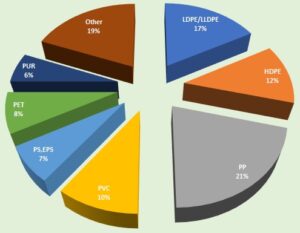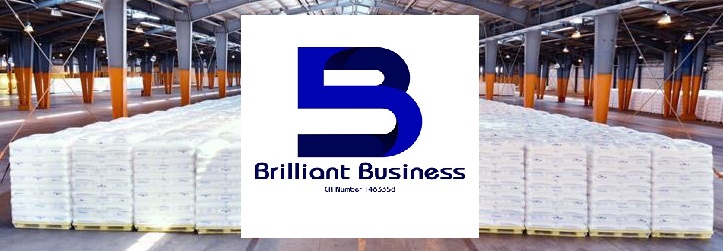At Brilliant Business, we supply both virgin polymers (pure, first-use materials) and recycled polymers (processed from post-consumer or post-industrial waste). Our range includes a variety of grades and types to meet the technical, environmental, and economic needs of our clients.
Among the functional virgin polymers that are used are the following:

-
Polyethylene (PE)
-
Polyvinyl chloride (PVC)
-
Polyvinyl acetate (PVA)
-
Polypropylene (PP)
-
Polytetrafluoroethylene (PTFE)
-
Polyetherimides (PI)
-
Polystyrene (PS)
-
Acrylonitrile butadiene styrene (ABS)
-
Polybutylene (PB)
LDPE – Low-Density Polyethylene
LDPE is a soft, flexible, and lightweight thermoplastic polymer made from the monomer ethylene. Known for its high ductility, low tensile strength, and transparency, LDPE is widely used in film and packaging applications due to its resistance to moisture, impact, and chemicals.
Industrial Applications
- Plastic bags, shopping bags, and garbage liners
- Agricultural films and mulch covers
- Squeeze bottles, wash bottles
- Flexible lids, tubing, and cable insulation
- Low-pressure irrigation pipes
- Film lamination and coating
Chemical Formula
(C₂H₄)ₙ— Polymerized Ethylene
Material Overview
- Form: Recycled granules or pellets
- Color: Transparent, natural, black, or custom
- MFI (Melt Flow Index): Varies (typically 0.3–4 g/10 min)
- Density: Approx. 0.910–0.940 g/cm³
Packaging Options
- 25 kg PP woven bags
- Jumbo bags ( available upon request)
Delivery Term
EXW/FCA, FOB (Free on Board) or as agreed with the buyer
HDPE – High-Density Polyethylene
HDPE is a strong, rigid, and high-density thermoplastic polymer derived from the polymerization of ethylene. It is known for its high strength-to-density ratio, chemical resistance, and durability, making it ideal for heavy-duty applications. Recycled HDPE retains much of its performance properties and is widely reused in industrial-grade products.
Industrial Applications
- Blow-molded containers (detergent bottles, jerrycans)
- Pipes and fittings for water, gas, and sewage systems
- Plastic pallets, crates, and drums
- Construction sheets, geomembranes
- Automotive parts (panels, liners, underbody shields)
- Household items (chairs, buckets, bins)
Chemical Formula
(C₂H₄)ₙ— polymerized ethylene (with high crystallinity)
Material Overview
- Form: Recycled granules or pellets
- Color: Natural, black, or custom colored
- MFI (Melt Flow Index): Typically 0.2–1.5 g/10 min
- Density: Approx. 0.940–0.970 g/cm³
Packaging Options
- 25 kg PP woven bags
- Jumbo bags ( available upon request)
Delivery Term
EXW/FCA, FOB (Free on Board) or as agreed with the buyer
PP – Polypropylene
Polypropylene (PP) is a semi-crystalline thermoplastic polymer known for its high stiffness, good chemical resistance, and excellent fatigue resistance (especially in hinge-type applications). As a lightweight and versatile plastic, recycled PP is widely reused across packaging, automotive, and household industries.
Industrial Applications
- Injection-molded parts (caps, lids, containers)
- Automotive components (dashboards, trims, battery casings)
- Household products (chairs, buckets, storage boxes)
- Woven sacks, ropes, fibers
- Packaging films and sheets
- Electrical and appliance housings
Chemical Formula
(C₃H₆)ₙ— polymerized propylene
Material Overview
- Form: Recycled granules or pellets
- Color: Natural, black, or customer-specified
- MFI (Melt Flow Index): Typically 3–30 g/10 min (depends on grade)
- Density: Approx. 0.895–0.920 g/cm³
Packaging Options
- 25 kg PP woven bags
- Jumbo bags ( available upon request)
Delivery Term
EXW/FCA, FOB (Free on Board) or as agreed with the buyer
PS / HIPS – Polystyrene / High Impact Polystyrene
Polystyrene (PS) is a brittle, transparent thermoplastic known for its rigidity and ease of molding. High Impact Polystyrene (HIPS) is a rubber-modified version of PS that offers enhanced impact resistance, flexibility, and durability, making it ideal for applications requiring greater strength and toughness. Both materials are widely recycled for cost-effective manufacturing.
Industrial Applications
- Food packaging (yogurt cups, meat trays, clamshell containers)
- Disposable cutlery and cups
- Refrigerator and freezer interiors
- Consumer electronics housings
- Toys and household items
- Signage and point-of-sale displays
Chemical Formula
(C₈H₈)ₙ— polymerized styrene (PS)
HIPS is PS blended with polybutadiene rubber for added impact strength
Material Overview
- Form: Recycled granules or flakes
- Color: Natural white, black, or customer-specific
- MFI (Melt Flow Index): Typically 3–10 g/10 min
- Density: Approx. 1.04–1.06 g/cm³
Packaging Options
- 25 kg bags
- Jumbo bags( available upon request)
Delivery Term
EXW/FCA, FOB (Free on Board) or as agreed with the buyer
ABS – Acrylonitrile Butadiene Styrene
ABS is a high-performance engineering thermoplastic made from three monomers: acrylonitrile, butadiene, and styrene. Known for its high impact strength, toughness, dimensional stability, and surface finish, recycled ABS is widely used in manufacturing durable and rigid plastic components, especially in automotive and electronics sectors.
Industrial Applications
- Automotive parts (dashboards, trims, interior panels)
- Consumer electronics (TV and monitor housings, remote controls)
- Household appliances (vacuum cleaners, kitchen tools)
- 3D printing filament
- Luggage shells, helmets, tool casings
- Toys (e.g., LEGO bricks)
Chemical Formula
Copolymer of:
Acrylonitrile (C₃H₃N)
Butadiene (C₄H₆)
Styrene (C₈H₈)
Material Overview
- Form: Recycled granules or pellets
- Color: Natural, black, gray, or custom colored
- MFI (Melt Flow Index): Typically 2–12 g/10 min
- Density: Approx. 1.03–1.06 g/cm³
Packaging Options
- 25 kg bags
- Jumbo bags(available upon request)
Delivery Term
EXW/FCA, FOB (Free on Board) or as agreed with the buyer
PET – Polyethylene Terephthalate
PET is a strong, lightweight, and transparent thermoplastic polyester widely used for its excellent mechanical strength, moisture resistance, and clarity. Recycled PET (RPET) is recovered primarily from post-consumer beverage bottles and is processed into either flakes or granules, suitable for various applications ranging from textiles to packaging.
Industrial Applications
- Fiber and yarn production for textiles and carpets
- Food and beverage packaging (bottles, containers, trays)
- Sheet extrusion for thermoforming
- Strapping and banding
- Industrial film and lamination
- Engineering plastics when blended with other polymers
Chemical Formula
(C₁₀H₈O₄)ₙ— condensation polymer of terephthalic acid and ethylene glycol
Material Overview
- Form: Washed flakes or recycled granules
- Color: Clear (natural), light blue, green, or custom
- IV (Intrinsic Viscosity): Typically 0.70–0.90 dl/g (depending on application)
- Density: Approx. 1.38–1.41 g/cm³
Packaging Options
- 25 kg bags
- Jumbo bags(on request)
Delivery Term
EXW/FCA, FOB (Free on Board) or as agreed with the buyer

